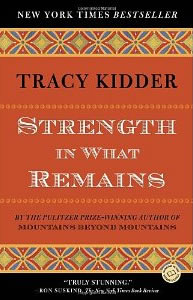Book Notes
 Tracy Kidder, Strength in What Remains (New York: Random House, 2009), 284pp.
Tracy Kidder, Strength in What Remains (New York: Random House, 2009), 284pp.
In the autumn of 1995 when Deogratias of Burundi entered Columbia University as a freshman, a classmate asked him if his father was an African king. It was an innocent question and a reasonable guess. Deo didn't tell him that one year earlier he had fled the Hutu-Tutsi genocide in his home country (which engulfed Rwanda six months later), landed in New York City with only $200 and no knowledge of English, then slept in abandoned tenement buildings, crack houses, and in Central Park as a homeless person. He was twenty-four years old. His is a tale of improbable survival and inspirational resilience.
Tracy Kidder has won numerous awards for his brilliant story telling, including a Pulitzer Prize and the National Book Award. Like his other books (cf. Mountains Beyond Mountains about Paul Farmer), Strength in What Remains has enjoyed a long ride on many best seller lists. In the first half of the book Kidder's chapters alternate between Deo's new life in New York and his former life in Burundi. In addition to his own resourcefulness, a half dozen ordinary people assisted Deo at critical junctures — a Senegalese baggage handler at JFK, the former Benedictine nun Sharon McKenna, an attorney who helped with immigration papers, a nameless Hutu mother on the chaotic Rwandan border who most assuredly saved the Tutsi Deo from becoming one of the 300,000 people who perished, and especially his adoptive parents Charlie and Nancy Wolf. By the end of the story Deo has connected with Paul Farmer and Partners in Health, and built a health clinic in Kigutu, Burundi (a Hutu village, no less) that opened in November 2007. See villagehealthworks.org.
But Kidder's book is far more than a feel-good story; it's a profoundly disturbing exploration of the Hutu-Tutsi genocide and of the "torment of memory," in Deo's case the "ungovernable quality" of his traumatic memories of carnage and survival. In Burundi, to gusimbura someone means to revive their painful memories, and it's an act which is considered worse than inconsiderate. It means to "out" someone's recollections. Is it possible to forget too much? To remember too much? Kidder's conclusion is worth quoting (p. 248):
A lot of western thought and psychological advice assume that it is healthy to flush out and dissect one's memories, and maybe this is true. And yet for all that, I began to have a simultaneous and opposite feeling: that there was such a thing as too much remembering, that too much of it could suffocate a person, and indeed a culture. Our tour of sites [with Deo back in Burundi and Rwanda] began to seem relentless. Observing Deo's endlessly renewed sorrow, I found myself thinking that there was something to to be said for a culture with a word like gusimbura.
In addition to telling Deo's story, Kidder provides brief histories of the political and cultural contexts of Burundi and Rwanda. The title for the book comes from a poem by Wordsworth. At the end of my edition of the book, there are eighteen questions for discussion.


